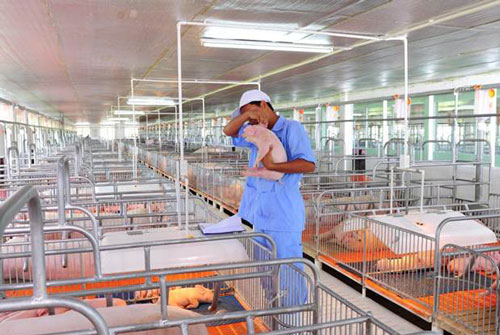04 Conditions to be recognized as animal epidemic-free zone/establishment in Vietnam
What are the conditions to be recognized as animal epidemic-free zone/establishment in Vietnam? - Hai Nam (Quang Ngai, Vietnam)

04 Conditions to be recognized as animal epidemic-free zone/establishment in Vietnam (Internet image)
Regarding this issue, LawNet responded as follows:
1. What is an animal epidemic-free zone/establishment?
According to Clause 5, Article 3 of the Law on Veterinary Medicine 2015, an animal epidemic-free zone/establishment means any zone/establishment raising animals and/or producing breeds that is identified to be free from the infectious diseases on the List of animal diseases subject to outbreak declaration for a time period specified for each disease, each species and veterinary activities in which ensure the control of such epidemic.
2. Conditions to be recognized as animal epidemic-free zone/establishment in Vietnam
Specifically, in Article 10 of Circular 24/2022/TT-BNNPTNT, the conditions for being recognized as an animal epidemic-free zone/establishment are as follows:
(1) Implementing measures to prevent animal diseases that meet the corresponding provisions of the law on veterinary medicine, husbandry, or fisheries and the professional guidance of the Veterinary Authority.
- The geographical location meets the provisions of the law on veterinary medicine, animal husbandry, or fisheries; it is separate from other establishments that raise animals or practice aquaculture with the same species of susceptible animals; it is segregated from potentially infectious sources, registered as safe;
- The area for treatment of animal carcasses and waste meets the conditions prescribed by the laws on environmental protection and veterinary medicine; livestock and aquaculture areas must be separated from other areas of the establishment; Areas at risk of cross-contamination must have warning signs and be arranged separately from each other, including:
+ Warehouses for agricultural materials;
+ Animal isolation area;
+ Area for surgery;
+ Animal carcass treatment area;
+ Areas for cleaning, disinfecting, and decontaminating tools used in animal husbandry and aquaculture;
- The supply water and wastewater treatment system must meet the technical requirements to minimize the risk of carrying pathogens, according to current regulations;
- Taking measures to prevent wild animals, other animal species, and vectors of disease transmission from entering the breeding and aquaculture areas;
- Having a system of disinfecting and decontaminating people, vehicles, tools, equipment, and other necessary supplies at the exits and entrances to establishments, breeding, and aquaculture areas;
- Having specialized equipment, tools, and means of transport, suitable for livestock and aquaculture subjects, easy to clean and disinfect to minimize the risk of carrying pathogens;
- Planning and organizing the implementation of biosecurity measures as prescribed in Article 5 of Circular 24/2022/TT-BNNPTNT.
(2) Planing and organizing the implementation of animal disease surveillance according to the provisions of Articles 6 and 7 of Circular 24/2022/TT-BNNPTNT.
(3) No outbreak of animal diseases: Complying with the provisions of Article 11 of Circular 24/2022/TT-BNNPTNT.
(4) Veterinary activities at the establishment ensure the control of animal diseases.
+ Complying with the corresponding provisions in Articles 14, 15, 19, 20, 25, 27, 28, 29, 32, 33 and Article 35 of the Law on Veterinary Medicine 2015, regulations on prevention and control of animal diseases of the Ministry of Agriculture and Rural Development and regulations in Circular 24/2022/TT-BNNPTNT;
- Planning and organize the implementation of measures to respond to the epidemic according to the provisions of Article 8 of Circular 24/2022/TT-BNNPTNT.
3. Responsibilities of recognized animal epidemic-free zone/establishment in Vietnam
An animal epidemic-free zone/establishment has the following responsibilities:
- Complying with approved guidelines and disease surveillance plans.
- Creating favorable conditions for competent agencies, organizations, and individuals to carry out supervision, appraisal, assessment, examination, and inspection at establishments and areas registered for epidemic safety.
- Maintaining conditions of establishments and regions as prescribed in Article 21 or Article 34 of Circular 24/2022/TT-BNNPTNT after being recognized as disease free.
- Timely notifying and coordinating with competent authorities to deal with requests from the importing country.
- Providing and reporting fully information and data on facilities and epidemic-free areas through the national online reporting system.
- Paying related expenses according to current regulations.
(Article 37 of Circular 24/2022/TT-BNNPTNT)
- Cases of land rent exemption and reduction under the latest regulations in Vietnam
- Economic infrastructure and social infrastructure system in Thu Duc City, Ho Chi Minh City
- Regulations on ordination with foreign elements in religious organizations in Vietnam
- Increase land compensation prices in Vietnam from January 1, 2026
- Determination of land compensation levels for damage during land requisition process in Vietnam
- Who is permitted to purchase social housing according to latest regulations in Vietnam?
-

- Notable new policies of Vietnam effective as of ...
- 16:26, 11/04/2025
-
.Medium.png)
- Notable documents of Vietnam in the previous week ...
- 16:21, 11/04/2025
-
.Medium.png)
- Notable documents of Vietnam in the previous week ...
- 16:11, 02/04/2025
-
.Medium.png)
- Notable new policies of Vietnam to be effective ...
- 16:04, 02/04/2025
-
.Medium.png)
- Notable new policies of Vietnam effective from ...
- 14:51, 21/03/2025
 (1).png)
 Article table of contents
Article table of contents
